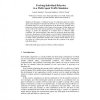Free Online Productivity Tools
i2Speak
i2Symbol
i2OCR
iTex2Img
iWeb2Print
iWeb2Shot
i2Type
iPdf2Split
iPdf2Merge
i2Bopomofo
i2Arabic
i2Style
i2Image
i2PDF
iLatex2Rtf
Sci2ools
116
click to vote
EVOW
2010
Springer
2010
Springer
Evolving Individual Behavior in a Multi-agent Traffic Simulator
Abstract. In this paper, we illustrate the use of evolutionary agents in a multiagent system designed to describe the behavior of car drivers. Each agent has the selfish objective to reach its destination in the shortest time possible, and a preference in terms of paths to take, based on the presence of other agents and on the width of the roads. Those parameters are changed with an evolutionary strategy, to mimic the adaptation of a human driver to different traffic conditions. The system proposed is then tested by giving the agents the ability to perceive the presence of other agents in a given radius. Experimental results show that knowing the position of all the car drivers in the map leads the agents to obtain a better performance, thanks to the evolution of their behavior. Even the system as a whole gains some benefits from the evolution of the agents’ individual choices.
Related Content
| Added | 28 May 2010 |
| Updated | 28 May 2010 |
| Type | Conference |
| Year | 2010 |
| Where | EVOW |
| Authors | Ernesto Sánchez, Giovanni Squillero, Alberto Paolo Tonda |
Comments (0)

